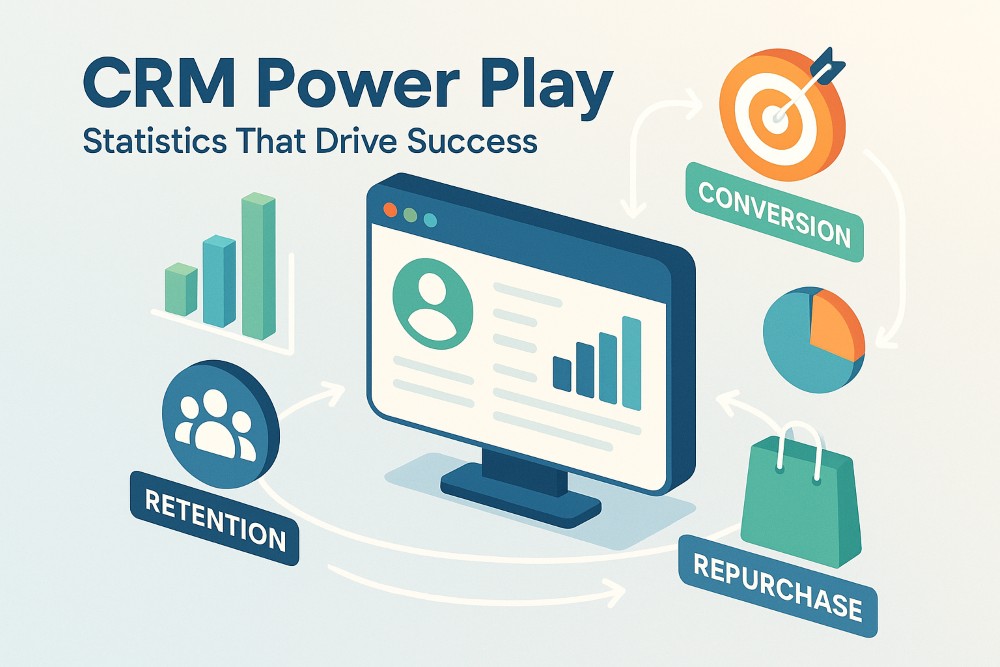Introduction
Consistently getting new clients and customers is a vital aspect of any sustainable business. It not only increases your business awareness and positioning in the market but also creates new avenues for revenue generation. This is where customer relationship management platforms can be a game changer for the majority of businesses. CRM platforms aid you to develop robust and harmonious relationships with your customers. It not only helps you keep your current clientele happy but also gives you insights to engage your prospects effectively. Essentially, it increases your potential for higher conversion, retention, and repurchases.

Customer relationship management tools aid in building lasting relationships with a far-reaching customer base. If you are still unsure whether the CRM is the right option for you, then 2026 CRM statistics mentioned in the blog can help you make up your mind. Keep reading to get a comprehensive breakdown of all the latest facts and CRM trends. Let us quickly get over the fundamentals first-
What Is CRM?
A CRM is a special system that manages organizations’ contacts and interactions with clients and leads. The purpose of CRM is to help the company enhance its relationship with customers, grow its business, and maximize its growth. CRM involves leveraging technology to automate, organize, and synchronize various processes. Essentially, CRM data can help streamline marketing, sales, technical support, and customer services. The right CRM tool has a direct impact on your customer experience and satisfaction.
CRM is utilized all around the world across all industries. For example, in the insurance section, companies utilize CRM for insurance to optimize their operations and ensure top-level customer service. Similarly, CRM for manufacturing companies helps streamline all customer interactions, forecast customer demands, enhance productivity, and improve decision-making.
In this blog, let us learn some of the latest CRM statistics to accentuate the usefulness of the platform in the present-day market scenario. The following CRM statistics will help you visualize how impactful CRM solutions have become across industries and business sizes.
How Prevalent Are CRM Platforms?
If you are new to the world of CRMs, you might wonder how many people actually use them. You might think that if the majority of businesses are doing just fine without a CRM platform, then you should really purchase it? However, this is not true as the following statistics suggest. Let us explore CRM statistics that demonstrate how prevalent these platforms are across industries.
In the Digital Marketing, CRM’s Popularity Is Growing Fast
Online marketing needs distinct types of software ranging from normal SEO plugins to expensive graphic design platforms. However, if there is one platform whose popularity is growing at an exponential rate, then it must be CRM. It must give you some idea just how relevant and ubiquitous CRM is in the industry. These CRM statistics reflect a strong upward trend in adoption among digital marketers.
Around 13% of Organization Say Making Investment in CRM Solutions Is Their Foremost Priority
Not only are companies investing heavily in the CRM platform, but a lot of them consider it to be their primary priority. In simple terms, CRM solutions are not just a great tool to have in your technology stack, but a lot of businesses consider it to be vital for sales and marketing efforts.
Around 92% of Organizations Consider CRM Software to be a Crucial Component in Achieving Revenue Objectives
When all things are considered, the end game of all businesses in any industry is revenue. Therefore, it is significant to understand that CRM solutions aid businesses in generating more profitability and revenue. CRM is a game-changer when it comes to ensuring more sales and revenue. This is quite evident from the next two CRM statistics.
Effective Sales Companies Are Approximately 81% More Likely to Adopt a CRM Solution Than Ineffective Ones
A lot of organizations are effective in driving higher sales performance. However, there are a few who face losses and don’t get things done. So, if you are starting a company, you would like to fall into the former category. Right? One of the first things you must do is find out what an effective sales organization is doing. And one of the things they are getting spot on is their choice of CRM platform. The above statistics simply mean that effective sales companies have an 81% higher probability of adopting a CRM tool than ineffective ones.
Around 65% of Worldwide Organization Are More Likely to Adopt a CRM Solution Within the First Five Years
Studies suggest that smart organizations adopt CRM platforms as soon as possible. Waiting for 2-3 years would only result in a lack of productivity, missed deadlines, and lost opportunities. It is recommendable to go for a scalable solution as soon as it is feasible for you. This is evident from 2026 CRM statistics as 65% of organizations adopt CRM software within the first five years of their business journey.
Now let’s explore CRM statistics that highlight the major advantages these platforms bring to modern businesses.
What Are the Advantages of Using a CRM?
Let us understand the key advantages of integrating a CRM product through these key statistics-
74% of Companies State That Leveraging a Feature-packed CRM Software Improves Accessibility to Customer Information
One of the most direct benefits of adopting CRM solutions is better centralization of customer data. This directly yields better organization and accessibility of customer data. Essentially, one of the main functionalities of CRM solutions is collating and centralizing all customer interactions. This ultimately aids in uncovering customer behavior patterns, forming insights, and data-driven decision making. Essentially, with the help of a CRM platform, you will be able to better understand your customers.
Around 47% of Organizations State That CRM Platform Has a Great Impact on Customer Retention
Enhancing your understanding of customer requirements puts you in a better position to improve your retention rate in the long term. Essentially, CRM lets you recognize your most profitable customers and their evolving preferences. Thus, it is an expected fact that around half of all companies say that CRM has aided them in retaining their customer base.
Using CRM Platforms Allow Organizations to Enhance Accuracy of Reports by 42%
This is yet another interesting CRM statistics. One of the important functionalities of a CRM tool is report generation. It helps businesses get access to accurate reports. A fully integrated CRM solution can compile customer information into valuable reports. Such reports can aid businesses in identifying and visualizing customer data, trends, and patterns. Studies suggest that CRM-generated reports are around 42% more accurate than the ones generated without CRM.
CRMs Can Help Businesses Enhance Their Sales Forecasting Accuracy by 42%
Apart from basic reporting capabilities, CRMs showcase greater accuracy in sales forecasting as well. This implies that these tools are the right solution if you want to figure out what type of sales trends you can expect down the road. This not only helps in decision making but also in strategizing the budget.
Start Today and Make These CRM Statistics Your Milestones
Do you want to be one of the companies that have turned their fortunes around by effectively utilizing CRM? Get tailored CRM solutions like OutRightCRM and drive revenue growth for your business. It can help you streamline your complete sales pipeline, giving you holistic visibility into customer data. All the user-friendly features, simple interface, and comprehensive customer support ease out the integration process and maximize your revenue potential. It supports your scalability goals, enabling you to grow with total convenience and ease.
Conclusion
The convincing CRM statistics data presented throughout the blog establishes the importance of CRM platforms for modern companies. With over 92% of businesses believing CRM to be the most vital technology for achieving revenue goals and successful sales organizations being 81% more likely to integrate these solutions, the evidence clearly reveals that CRM execution correlates directly with the success of the business. Companies also state approximately 74% better accessibility to customer data, 47% improved retention rates, and around 42% higher accuracy in terms of sales forecasting and reporting.
These CRM statistics reveal that CRM solutions are no longer just optional upgrades. They are the vital infrastructure businesses need to stay competitive in the market and achieve sustainable growth.
Author’s Bio

Hello, I am Ashish Dwivedi. I am a core CRM developer with 15+ years of experience in delivering efficient CRM solutions that drive business growth and efficiency. I specialize in creating extensions for SuiteCRM and SugarCRM. My most notable extensions include SuiteCRM Email to Lead, SugarCRM Mailchimp, and SuiteCRM BCC Archiver. I also have a CRM of my own called OutRightCRM.








